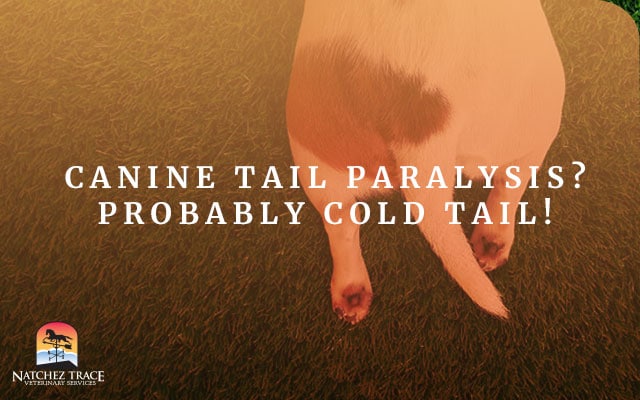What is Cold Tail or Limber Tail Syndrome?
The cold tail is a syndrome or injury occurring mostly in sporting or working dogs, such as Labs and Pointers.
Cold tail syndrome is also known as:
- Limber tail
- Swimmer’s tail
- Cold water tail
- Broken tail
- Dead tail
- Happy tail
- Broken wag
The tail just quits working!
The injury or syndrome affects your dog’s tail. It becomes painful at or near the base.
What are the Symptoms?
The symptoms of limber tail are:
- A very flaccid tail
- Holding the tail horizontally for approximately 10 cm, and then dropping vertically.
- More pronounced in dogs that wag their tails a lot
- Some affected dogs are in pain and frustrated
Sometimes, other changes are seen prior to or in conjunction with cold tail, such as:
- Urinary or fecal incontinence
- Pain when the lower back is touched
- Postural pelvic abnormalities
What Are The Causes?
Many dog owners report cold tail showing up 24 hours) after swimming in water that is too cold.
Sometimes, also on rare occasions where the water is too warm.
Unfortunately, limber tail’s actual cause is unknown.
However, some vets theorize it may be due to the narrowing of the space through which the spinal cord passes.
Most likely, it would happen because of a degenerative change to the intervertebral disk spaces.
Degenerative underlying changes don’t show up until the problem is suddenly exacerbated, like after trauma or during physical extreme activity.
What’s The Best Way to Help My Dog?
Treatment is rest and symptomatic therapy.
Resolution occurs in about two weeks.
The cold tail can be confused with trauma to the tail.
Oftentimes, an X-ray is indicated to differentiate the two!
Another treatment option I have used is acupuncture at the base of the tail.
We insert needles perpendicular to the skin at the base of the tail and stimulate the needles with an electroacupuncture machine.
This technique aids in alleviating pain, swelling, inflammation, and discomfort!
To learn more about the treatment you may contact us for a consultation.








